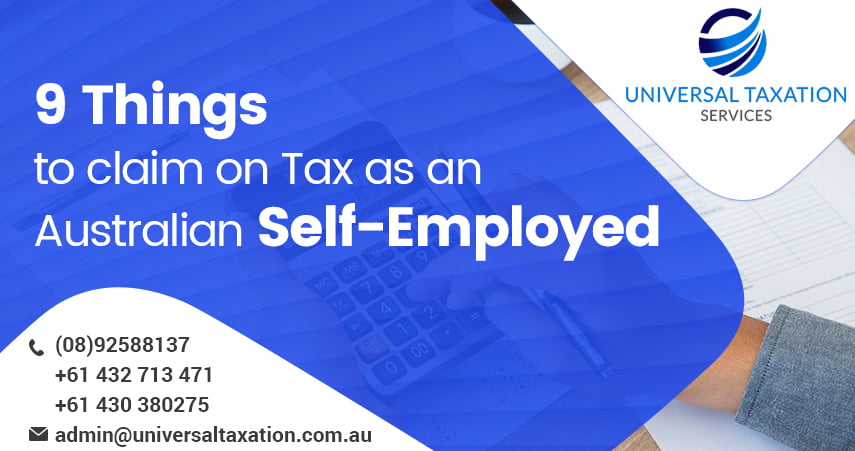
Tax Free Threshold in Australia: Basics & How to Claim it? [With FAQs]
December 5, 2018
10 Tax Deductions for Small Business Owners in Australia
June 26, 2019Every day, there are thousands of people who want to quit their boring job and want to start their own venture. They dream of not needing to answer to a superior and calling the shots to all the important decisions.
Self-employment is satisfactory and rewarding in many ways. The perks of working for yourself will seem unsatisfactory if you are not able to navigate your way through it tactfully.
Financial security is one of the most important aspects, and so is a tax deduction. It might seem very complicated to understand the tax deductions for this type of work.
Here are 9 Self-employment Tax Deductions if you are Based in Australia:
- Home Office: Most people who wish to become self-employed start off by establishing an office in their home. This will reduce the cost of renting out another space specifically for this purpose. It also comes as an advantage when it is time to file for your annual tax deductions.
When you have a setup in your house, solely for work, the expenses related to it can be deducted. For example, the costs of air conditioning or heating systems can be considered.
The electricity bills and money spent on buying office equipment can be included. To be able to deduct these costs from tax, you will need to maintain strict records of the hours that you have spent in the office and submit proofs if necessary.
- Car & Travel Expenses: You can claim tax deductions on car and travel expenses if the travel is related to your work. The following expenses can be claimed:
- Car expenses for work-related tasks (except when going to and coming from workplace)
- Parking costs
- Toll fees
- Taxi fares
- Flight fares
- Accommodation expenses if one has to stay in a hotel for work
- Capital Expenditures: For any company to grow and sustain itself, physical assets are important. These assets give a sense of stability to the company and also increase the scope of expansion.
In the beginning, capital expenses are usually lesser than $6500, and you can claim back every penny of it. Larger investments, however, can be claimed gradually over the years. Such investments include vehicles, computers, printers, Xerox machines, any fittings for warehouse or office and other types of equipment.
The advantage of claiming for items over a span of time is that their capital value decreases. If you claim 15% for an item in the first year, it will become 30% from the years thereafter.
- Tools & Equipments: If you need to purchase relevant equipment for your job, like a computer, mobile, power tools or machinery, one can claim deductions on the purchases any time or over a period of time.
- One can claim up to $1000 in your annual tax return for tools and equipment required to do your job
- You can claim depreciation on all kinds of tools and equipment that are priced more than $1000 (including an instant write off on asset purchases up to an amount of $20,000)
- Utility Bills: Whether you have an office at your home or you are simply renting the space to someone else, one of the highest expenditures is utility bills. An office works round the clock and is open for most of the day, which means that resources are being used continuously.
The most commonly used utility bills are of electricity, gas, and water. It can be quite expensive to heaters or coolers running the entire day to provide a comfortable temperature for the employees.
Almost everything at the office is run by electricity, be it using the copier or a coffee machine. Hence, every utility bill can be claimed for a tax deduction.
- Claim Depreciation: Any assets bought for the company can be claimed, either immediately or over a period of time. In this manner, you will not be spending too much on getting the assets needed.
Any asset that is bought for less than $300 can be instantly claimed and deducted. Items like calculators, equipment, books, and other stationery might seem like small things to buy but can become a bit over the budget when bought in bulk.
Being self-employed needs you to save as much money as possible. In the case of assets, which cost more than $300 can have tax deducted slowly with time. The amount that will be deducted will depend on the value, effectiveness, and life of the said product.
- Education: There is always room for personal improvement, especially if you are self- employed and your skills play a vital role in the job you do. It can add value and change your perspective on ideas but paying for education is not cheap.
If you decide to self-educate yourself and if the subject of the study will help improve your work, it can be claimed in tax. Self- education expenses may include fees, textbooks and notebooks, stationery, student union fees, and other necessities like laptop etc. Loan repayment for higher education cannot be included.
- Maximize Tax Offsets: There are various kinds of tax offsets, and you may check if you are eligible for any of those. There are low-income tax offset, senior pensioner and Australian tax offset and also superannuation.
Superannuation can be the money that you contribute on behalf of a spouse who has a low income. These tax offsets are an advantage as they directly affect the amount of tax you pay, and it can get considerably lesser.
Your eligibility will depend upon the income you receive, the conditions of the offset that you need to meet, and also your family situation.
- Superannuation Contributions: There are both concessional and non-concessional contributions that can be made before the end of the financial year. The concessional caps have a limit which may change from year to year.
They can include contributions from employee salary amounts or can be personal. It is important to stay in the limit of the cap because the excess amount paid will be taxed separately. If there is excessive money, it is advisable to remove it before June 30 so that it does not count in contributions.
For those who are self-employed personal contributions that have been claimed will add to your concessional contribution cap. If you have employees that have contributed, you can claim it as well. Firstly a notice of intent needs to be lodged and only when it is approved will you be able to claim for deduction.
Taking Help from Professionals:
During every financial year-end (July to June), one is expected to submit tax returns to the government. One can fill out forms online if taxes can be resolved easily and your financials are easy to comprehend. Otherwise, it is useful to have a tax agent to file your tax returns for you.
A professional tax agency like Universal Taxation, can guide you on the varied tax deductions meant for freelancers, along with the stipulated obligations to the ATO. The company makes tax return filings hassle-free for you while ensuring that the records are perfect the first time around. Try to abide by a simple motto here: “If you’re not sure about it, ask!”


